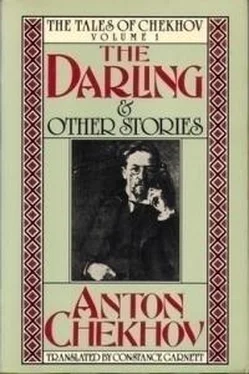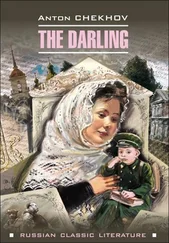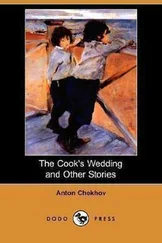Антон Чехов - The Darling
Здесь есть возможность читать онлайн «Антон Чехов - The Darling» — ознакомительный отрывок электронной книги совершенно бесплатно, а после прочтения отрывка купить полную версию. В некоторых случаях можно слушать аудио, скачать через торрент в формате fb2 и присутствует краткое содержание. Год выпуска: 2014, Издательство: epubBooks Classics, Жанр: Классическая проза, на английском языке. Описание произведения, (предисловие) а так же отзывы посетителей доступны на портале библиотеки ЛибКат.
- Название:The Darling
- Автор:
- Издательство:epubBooks Classics
- Жанр:
- Год:2014
- ISBN:нет данных
- Рейтинг книги:5 / 5. Голосов: 1
-
Избранное:Добавить в избранное
- Отзывы:
-
Ваша оценка:
- 100
- 1
- 2
- 3
- 4
- 5
The Darling: краткое содержание, описание и аннотация
Предлагаем к чтению аннотацию, описание, краткое содержание или предисловие (зависит от того, что написал сам автор книги «The Darling»). Если вы не нашли необходимую информацию о книге — напишите в комментариях, мы постараемся отыскать её.
The Darling — читать онлайн ознакомительный отрывок
Ниже представлен текст книги, разбитый по страницам. Система сохранения места последней прочитанной страницы, позволяет с удобством читать онлайн бесплатно книгу «The Darling», без необходимости каждый раз заново искать на чём Вы остановились. Поставьте закладку, и сможете в любой момент перейти на страницу, на которой закончили чтение.
Интервал:
Закладка:
Manetchka flushed again, but this time she said nothing.
"We have to make them all over again. And God knows we are not so well off. We are all alone in the world now."
"We are alone in the world," repeated Manetchka.
A year ago fate brought me once more to the little house.
Walking into the drawing–room, I saw the old lady. Dressed all in black with heavy crape pleureuses , she was sitting on the sofa sewing. Beside her sat the little old man in the brown coat and the goloshes instead of boots. On seeing me, he jumped up and ran out of the room.
In response to my greeting, the old lady smiled and said:
"Je suis charmée de vous revoir, monsieur."
"What are you making?" I asked, a little later.
"It's a blouse. When it's finished I shall take it to the priest's to be put away, or else Yegor Semyonitch would carry it off. I store everything at the priest's now," she added in a whisper.
And looking at the portrait of her daughter which stood before her on the table, she sighed and said:
"We are all alone in the world."
And where was the daughter? Where was Manetchka? I did not ask. I did not dare to ask the old mother dressed in her new deep mourning. And while I was in the room, and when I got up to go, no Manetchka came out to greet me. I did not hear her voice, nor her soft, timid footstep….
I understood, and my heart was heavy.
The Helpmate
"I'VE asked you not to tidy my table," said Nikolay Yevgrafitch. "There's no finding anything when you've tidied up. Where's the telegram? Where have you thrown it? Be so good as to look for it. It's from Kazan, dated yesterday."
The maid—a pale, very slim girl with an indifferent expression —found several telegrams in the basket under the table, and handed them to the doctor without a word; but all these were telegrams from patients. Then they looked in the drawing–room, and in Olga Dmitrievna's room.
It was past midnight. Nikolay Yevgrafitch knew his wife would not be home very soon, not till five o'clock at least. He did not trust her, and when she was long away he could not sleep, was worried, and at the same time he despised his wife, and her bed, and her looking–glass, and her boxes of sweets, and the hyacinths, and the lilies of the valley which were sent her every day by some one or other, and which diffused the sickly fragrance of a florist's shop all over the house. On such nights he became petty, ill–humoured, irritable, and he fancied now that it was very necessary for him to have the telegram he had received the day before from his brother, though it contained nothing but Christmas greetings.
On the table of his wife's room under the box of stationery he found a telegram, and glanced at it casually. It was addressed to his wife, care of his mother–in–law, from Monte Carlo, and signed Michel …. The doctor did not understand one word of it, as it was in some foreign language, apparently English.
"Who is this Michel? Why Monte Carlo? Why directed care of her mother?"
During the seven years of his married life he had grown used to being suspicious, guessing, catching at clues, and it had several times occurred to him, that his exercise at home had qualified him to become an excellent detective. Going into his study and beginning to reflect, he recalled at once how he had been with his wife in Petersburg a year and a half ago, and had lunched with an old school–fellow, a civil engineer, and how that engineer had introduced to him and his wife a young man of two or three and twenty, called Mihail Ivanovitch, with rather a curious short surname—Riss. Two months later the doctor had seen the young man's photograph in his wife's album, with an inscription in French: "In remembrance of the present and in hope of the future." Later on he had met the young man himself at his mother–in–law's. And that was at the time when his wife had taken to being very often absent and coming home at four or five o'clock in the morning, and was constantly asking him to get her a passport for abroad, which he kept refusing to do; and a continual feud went on in the house which made him feel ashamed to face the servants.
Six months before, his colleagues had decided that he was going into consumption, and advised him to throw up everything and go to the Crimea. When she heard of this, Olga Dmitrievna affected to be very much alarmed; she began to be affectionate to her husband, and kept assuring him that it would be cold and dull in the Crimea, and that he had much better go to Nice, and that she would go with him, and there would nurse him, look after him, take care of him.
Now, he understood why his wife was so particularly anxious to go to Nice: her Michel lived at Monte Carlo.
He took an English dictionary, and translating the words, and guessing their meaning, by degrees he put together the following sentence: "I drink to the health of my beloved darling, and kiss her little foot a thousand times, and am impatiently expecting her arrival." He pictured the pitiable, ludicrous part he would play if he had agreed to go to Nice with his wife. He felt so mortified that he almost shed tears and began pacing to and fro through all the rooms of the flat in great agitation. His pride, his plebeian fastidiousness, was revolted. Clenching his fists and scowling with disgust, he wondered how he, the son of a village priest, brought up in a clerical school, a plain, straightforward man, a surgeon by profession—how could he have let himself be enslaved, have sunk into such shameful bondage to this weak, worthless, mercenary, low creature.
"'Little foot'!" he muttered to himself, crumpling up the telegram; "'little foot'!"
Of the time when he fell in love and proposed to her, and the seven years that he had been living with her, all that remained in his memory was her long, fragrant hair, a mass of soft lace, and her little feet, which certainly were very small, beautiful feet; and even now it seemed as though he still had from those old embraces the feeling of lace and silk upon his hands and face—and nothing more. Nothing more—that is, not counting hysterics, shrieks, reproaches, threats, and lies—brazen, treacherous lies. He remembered how in his father's house in the village a bird would sometimes chance to fly in from the open air into the house and would struggle desperately against the window–panes and upset things; so this woman from a class utterly alien to him had flown into his life and made complete havoc of it. The best years of his life had been spent as though in hell, his hopes for happiness shattered and turned into a mockery, his health gone, his rooms as vulgar in their atmosphere as a cocotte's, and of the ten thousand he earned every year he could never save ten roubles to send his old mother in the village, and his debts were already about fifteen thousand. It seemed that if a band of brigands had been living in his rooms his life would not have been so hopelessly, so irremediably ruined as by the presence of this woman.
He began coughing and gasping for breath. He ought to have gone to bed and got warm, but he could not. He kept walking about the rooms, or sat down to the table, nervously fidgeting with a pencil and scribbling mechanically on a paper.
"Trying a pen…. A little foot."
By five o'clock he grew weaker and threw all the blame on himself. It seemed to him now that if Olga Dmitrievna had married some one else who might have had a good influence over her—who knows?— she might after all have become a good, straightforward woman. He was a poor psychologist, and knew nothing of the female heart; besides, he was churlish, uninteresting….
"I haven't long to live now," he thought. "I am a dead man, and ought not to stand in the way of the living. It would be strange and stupid to insist upon one's rights now. I'll have it out with her; let her go to the man she loves…. I'll give her a divorce. I'll take the blame on myself."
Читать дальшеИнтервал:
Закладка:
Похожие книги на «The Darling»
Представляем Вашему вниманию похожие книги на «The Darling» списком для выбора. Мы отобрали схожую по названию и смыслу литературу в надежде предоставить читателям больше вариантов отыскать новые, интересные, ещё непрочитанные произведения.
Обсуждение, отзывы о книге «The Darling» и просто собственные мнения читателей. Оставьте ваши комментарии, напишите, что Вы думаете о произведении, его смысле или главных героях. Укажите что конкретно понравилось, а что нет, и почему Вы так считаете.












